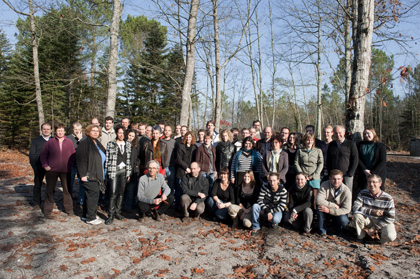
Biodiversity Reading time 7 min
Antoine Kremer, barking up the right tree
Published on 07 December 2011
“I try to understand how forest species respond to natural and artificial phenomena”
“Genetic diversity between two randomly selected forest oaks is four times greater than the diversity between two humans in a given population! Forest trees are able to maintain wide ranges of genetic diversity that enable them to adapt quickly despite long generation times”, the forest and genome researcher explains. “I try to understand how forest species respond to natural and artificial phenomena. Evolution is a central issue in the context of climate change”. Combining historic and genetic approaches to more than 2600 forests, he reconstitutes the scenario of oak implantation in Europe and elucidates the mechanisms which have lead to their adaptation.
Combining genetic and historical data
In the 1980s, when research in the genetics of trees was limited to selection and improvement, Antoine Kremer applied data to diversity management in forest populations, an initiative no doubt attributable to his dual background in forestry engineering and quantitative genetics. “In the early 1980s, pedunculate oak forests died off following droughts in 1975-76. I wanted to understand why certain populations were affected and not others, and imagined this was due to genetic differences developed over time. I received support from the French Forestry Bureau (ONF) and later from the European Union to explore these phenomena, first in France and later across Europe”. Fairoak, the European research project thus created, combined genetic and historical data and computer-simulated scenarios to reconstruct the history of European oak populations from the last glaciation onwards. “To my knowledge, this approach had never been used before with other species and has become an example”.
How the future history of forests is written
In 1992, at the request of the Forestry Unit, Antoine Kremer launched a research program focused on tropical species diversity in French Guyana. An enthusiastic worker, he was named Research Director in 1995 and Director of the French Biodiversity Institute in 2001. In 2003 Dr Kremer was awarded the European Forest Research Award and named Director of the newly created Joint Research Unit for Biodiversity, Genes and Communities (BIOGECO) at INRA-University of Bordeaux. He became the first French scientist to win the Marcus Wallenberg Prize, the "Nobel Prize in the world of wood", in 2006 for his work on tree genetics. Since 2006 he has coordinated Evoltree, a network of excellence made up of 25 research centres in 15 countries aimed at combining ecology, evolution and genomics to understand how trees evolve and adapt in response to environmental change. Dr Kremer is a talented communicator who builds connections: “Creating a climate of confidence between different teams is important to make things work on a group and individual level.” Committed to sharing his expertise, he has received an increasing number of invitations to speak at conferences for the general public. In 2011, he received the INRA Agricultural Research Award for scientific excellence. .
Since 2011, Dr Kremer has coordinated the Evoltree network and the COTE Laboratory of Excellence, financed by the French Stimulus Initiative. This network of 200 scientists works toward understanding and predicting responses of different ecosystems (coastal and continental, natural and domesticated populations) to environmental change. “Combining research on ecosystems is an essential tool in understanding and predicting how natural environments and resources respond to environmental change”.
The INRA Awards?
“This award reflects the work of a team from several French and foreign research centres. Research in the evolutionary biology of forests has been successfully conducted with no internal or external constraints. I am deeply grateful to all the organizations that provided support”.

- 61 years old
- Academic background: forestry engineer, Doctorate in quantitative genetics
- Loves cycling, rock music, photography
- Winner of the 2006 Marcus Wallenberg Prize
- 2011 INRA Agricultural Research Award for scientific excellence
- Recipient of a ERC Advanced Grant in 2013
